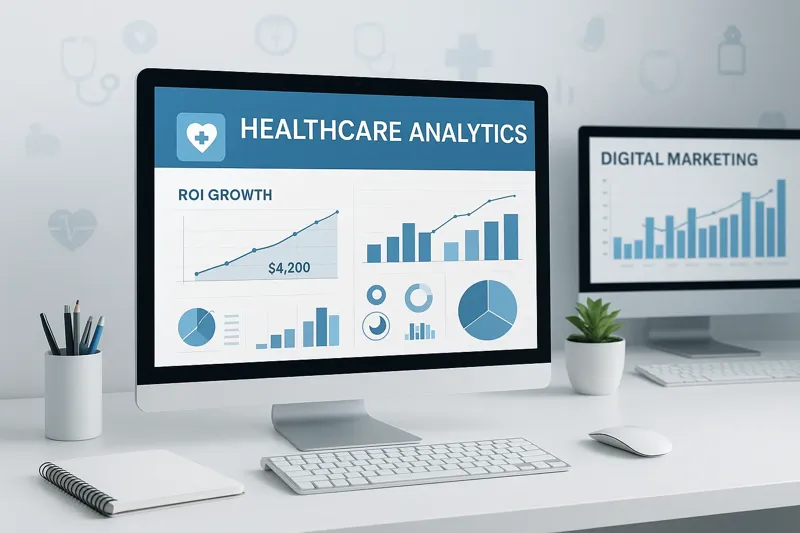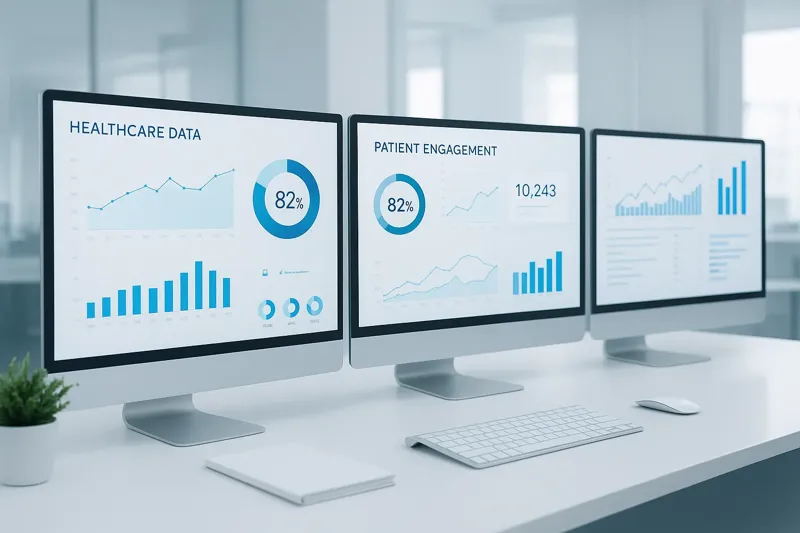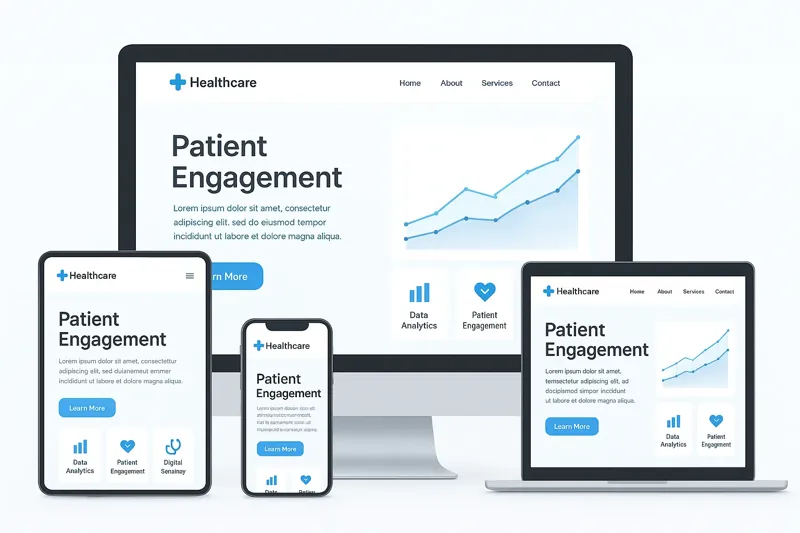The Vital Role of Digital Marketing in Modern Healthcare
Importance of Digital Marketing in Healthcare
Digital marketing has become indispensable in healthcare due to the significant shift in how patients seek and engage with health information. Approximately 77% of patients conduct online research before booking appointments, underscoring the necessity for healthcare providers to maintain a strong digital presence. Digital channels enable organizations to reach patients efficiently, improve brand visibility, and foster trust.
Patient Online Research Behaviors
With over 93 million Americans actively searching for health-related information online, patient engagement through digital platforms is high. Research reveals that search engines direct three times as many visitors to hospital websites compared to other sources. Additionally, mobile search now accounts for over half of these queries, highlighting the critical need for mobile-optimized websites and seamless user experiences across devices.
Rise of Digital Engagement Post-Pandemic
The COVID-19 pandemic accelerated the reliance on digital tools within healthcare. Patients have normalized digital interactions such as telehealth consultations and online appointment scheduling. This surge emphasizes the importance of multi-channel strategies that include web presence, social media, and mobile outreach to meet evolving patient expectations and maintain continuous engagement.
Overview of Key Digital Channels
Healthcare providers leverage several digital marketing channels to connect with patients effectively:
- Search Engine Optimization (SEO): Enhances visibility when patients seek health information.
- Social Media: Influences over half of patients’ treatment decisions and supports community engagement.
- Email Marketing: Provides personalized and educational communication, optimized for mobile devices.
- Video Content: Increases landing page conversions by up to 80%, fostering trust through patient stories. These integrated approaches enable healthcare organizations to attract, acquire, and retain patients while adhering to privacy and compliance standards.
Leveraging SEO and Mobile Optimization to Capture Patient Attention
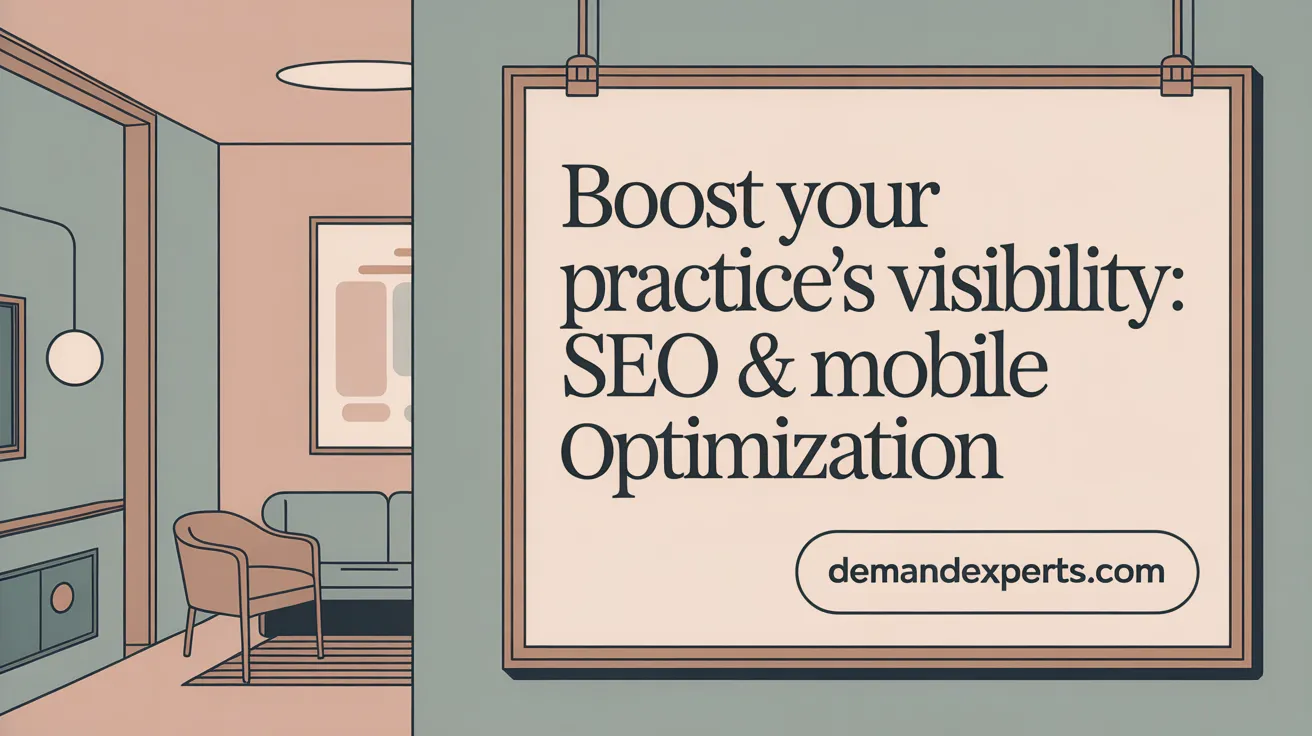
Why is SEO critical for healthcare providers?
Search engines are the dominant gateway for patients seeking healthcare information online, driving three times more visitors to hospital websites than all other sources combined. This trend necessitates the implementation of effective Search Engine Optimization (SEO) strategies. Robust SEO improves online visibility, enabling healthcare providers to reach patients actively researching symptoms, treatments, or provider options. Technical SEO elements—including keyword research, compelling meta descriptions, and compliance with Google's E-A-T (Expertise, Authoritativeness, Trustworthiness) guidelines—ensure websites rank highly in relevant search queries, establishing credibility and improving patient trust.
How does mobile optimization affect patient engagement?
More than half of all healthcare-related online searches originate on mobile devices. This shift toward mobile usage places significant importance on having mobile-optimized websites. Effective mobile design ensures responsive layouts, fast loading times, and user-friendly navigation tailored for smaller screens. Data shows that approximately 44% of patients who research hospital services on a mobile device proceed to schedule appointments, reinforcing the direct impact mobile optimization has on patient conversion rates. Given this, healthcare organizations should prioritize mobile-friendly content and consider dedicated mobile apps or simplified interfaces to enhance the patient experience (Healthcare mobile marketing trends 2023).
Enhancing patient reach through local SEO and reputation management
Local SEO strategies help healthcare providers attract patients within specific geographical areas by optimizing for search terms such as "urgent care near me" or "family physician in [city]." Tactics include creating localized web pages, maintaining accurate directory listings, and collecting patient reviews. Reputation management plays a vital role in local SEO, as a majority of patients consult recent online reviews—particularly on Google—before choosing providers. Timely responses to reviews and leveraging positive patient testimonials build credibility, increase search rankings, and ultimately drive patient acquisition.
Technical SEO considerations in healthcare marketing
Healthcare websites must incorporate technical SEO best practices, including structured data implementation, XML sitemaps, and robots.txt files, to support crawlability and indexation by search engines. Regular audits improve website health and user experience, while voice search optimization is increasingly relevant as patients use voice-enabled assistants to find healthcare information. Ensuring compliance with privacy and content quality guidelines further enhances ranking potential and patient trust.
By integrating comprehensive SEO strategies with mobile optimization and local reputation management, healthcare organizations can effectively capture patient attention, drive appointment bookings, and enhance overall digital engagement (Importance of digital marketing in healthcare).
The Power of Video and Content Marketing in Building Trust
How effective is video marketing for healthcare providers?
Video marketing stands out as a highly effective tool in healthcare digital marketing, capable of increasing conversion rates on landing pages by up to 80%. This substantial boost underscores its power in turning web visitors into engaged patients. Videos that showcase patient stories and testimonials deepen trust, making healthcare providers appear more relatable and credible. These authentic narratives help prospective patients feel confident and emotionally connected, which significantly influences their healthcare decisions. For additional insights, see Benefits of video marketing in healthcare.
What role does content marketing play in patient engagement?
Content marketing serves as a cornerstone strategy for establishing healthcare providers as trusted authorities. By delivering high-quality, accurate, and personalized content, healthcare marketers can enhance patient education and engagement. Informative blogs, wellness tips, and procedure guides not only attract more visitors but also enable patients to make knowledgeable choices regarding their care. Learn more about Content marketing in healthcare and Personalized healthcare marketing campaigns.
Educational content's impact in healthcare marketing
Educational content builds a foundation of trust by addressing patients' concerns, demystifying medical information, and guiding them through their health journeys. When paired with personalized delivery—leveraging patient data and segmentation—this content fosters ongoing engagement and supports treatment adherence. See resources on Educational content in healthcare marketing emails and Patient engagement strategies.
Integrating video and content marketing for maximum impact
Combining video content with well-crafted written materials creates a comprehensive digital marketing approach. Videos engage senses and emotions, while detailed written content satisfies the need for in-depth information. Together, they enhance patient experience, credibility, and ultimately, patient growth for healthcare organizations. For further reading, review Video marketing in healthcare and Healthcare digital marketing strategies.
Harnessing Social Media to Influence Patient Decisions and Build Community
How does social media affect patient healthcare decisions?
Social media significantly impacts patient healthcare choices. Studies show that 57% of patients’ decisions to pursue treatment are influenced by healthcare providers’ social media presence. This demonstrates the power of social channels as a direct line to patients for education, trust-building, and engagement. Platforms such as Facebook, YouTube, and WhatsApp offer vast reach and help patients discover reliable health information, reviews, and testimonials that guide their decisions (Patient education through social media, Healthcare social media marketing strategies, Social media influence on patient decisions.
What strategies optimize social media for healthcare marketing?
Effective healthcare social media marketing employs a mix of organic content, paid advertising, and influencer collaborations. Organic content—including educational posts, wellness tips, and patient stories—builds ongoing engagement and credibility. Paid campaigns allow targeted outreach to specific demographics and geographic areas, amplifying visibility and lead generation.
Employing culturally competent messaging ensures inclusivity and relevance, fostering stronger community connections. Influencer partnerships with healthcare professionals can enhance authenticity and reach (Healthcare social media marketing strategies, Healthcare digital marketing strategies, Healthcare influencer marketing).
Building online patient communities and support groups
Creating online patient communities on social media platforms such as Facebook groups or Google Hangouts provides safe spaces for peer support and information sharing. These groups foster emotional engagement, improve health literacy, and encourage behavioral changes like smoking cessation. They also strengthen patient loyalty and trust toward healthcare providers (Patient engagement strategies, Patient education through social media, Social media for patient engagement).
Social media usage statistics among patients
Approximately 69% of Americans use Facebook, and 73% use YouTube, highlighting high patient engagement. In developing regions, platforms like WhatsApp see usage rates as high as 80%, underlining the global potential for healthcare outreach (Patient education through social media, Social media usage statistics).
Together, these social media strategies form a comprehensive approach to influence patient decisions, improve educational outreach, and build supportive healthcare communities in compliance with privacy standards (Digital marketing in healthcare, HIPAA compliance in digital marketing).
Personalized Patient Engagement Through Healthcare CRM Platforms
How do healthcare CRM systems improve patient engagement?
Healthcare CRM platforms are pivotal in transforming patient engagement by offering a comprehensive 360-degree view of patient information. These systems integrate clinical, demographic, and behavioral data to enable highly personalized communication strategies. AI-driven recommendations facilitate timely interventions by suggesting next-best-actions tailored to each patient's unique profile, such as medication reminders or educational content delivery.
Automation capabilities streamline patient communication processes, ensuring consistent outreach without burdening staff. This automation supports therapy adherence and treatment initiation by sending personalized messages through preferred channels, enhancing both the efficiency and effectiveness of engagement.
Why is segmentation important in healthcare marketing?
Segmentation in healthcare marketing is essential for delivering relevant and impactful messaging. By categorizing patients based on demographics, clinical history, behavioral patterns, and social determinants of health (SDoH), healthcare marketers can tailor campaigns that resonate more deeply with diverse patient groups. For insights into digital patient acquisition strategies, including segmentation, see this resource.
This targeted approach improves patient responsiveness and supports better health outcomes by addressing individual needs and barriers. For example, patients with chronic conditions can receive specialized content and follow-up reminders, while high-risk populations might be engaged with preventive care messaging.
Benefits of Personalization Using CRM Platforms
- Enhanced patient adherence: AI-powered insights inform personalized care plans and communication.
- Efficient communication: Automated workflows reduce administrative overhead.
- Improved outreach: Tailored campaigns boost treatment initiation rates.
- Compliance assurance: Platforms ensure messaging aligns with healthcare regulations.
Healthcare CRM platforms empower organizations to execute data-driven, patient-centric marketing strategies that not only foster trust but also drive measurable improvements in patient retention and care outcomes. More on Patient Engagement Software and AI-Driven Patient Experience.
Strategic Email and SMS Marketing for Patient Retention and Education
What makes email marketing effective in healthcare?
Email marketing stands out as a cost-effective and impactful tool in healthcare marketing. Its effectiveness is driven by mobile optimization, ensuring content is accessible and engaging on smartphones where over 80% of patients access information. Personalization through segmentation allows healthcare providers to tailor messages based on patient demographics, health history, and preferences, which enhances relevance and promotes higher engagement. Clear and compelling calls to action within emails guide patients toward scheduling appointments, accessing educational content, or managing their care effectively, facilitating both retention and ongoing patient education.
How do SMS campaigns complement email outreach?
SMS marketing delivers concise, instant communication, serving as a timely reminder tool that complements the more detailed engagement provided by email. Its immediacy and high open rates make SMS ideal for appointment confirmations, medication reminders, and preventive care prompts. These short, actionable messages increase adherence to care plans by reducing missed appointments and improving medication compliance, thereby supporting overall patient outcomes and satisfaction. For additional insights, see healthcare SMS marketing.
Privacy and HIPAA compliance considerations
Both email and SMS campaigns in healthcare must rigorously comply with HIPAA compliance in digital marketing and data privacy regulations. This involves securing patient consent, encrypting communications, and implementing robust data protection measures. Ensuring that marketing platforms and messages meet privacy standards maintains patient trust and safeguards sensitive health information. Learn more about HIPAA compliance in healthcare marketing.
Mobile optimization and segmentation in email campaigns
Optimizing emails for mobile devices is essential given the predominance of mobile searches and digital interactions. Segmentation strategies enhance effectiveness by delivering relevant, timely content that aligns with individual patient needs. Combining these practices fosters stronger patient-provider relationships by offering personalized, accessible communication that supports patient education and retention. For strategies and data, refer to mobile-optimized email campaigns.
Applying Data Analytics and Conversation Intelligence to Optimize Campaigns
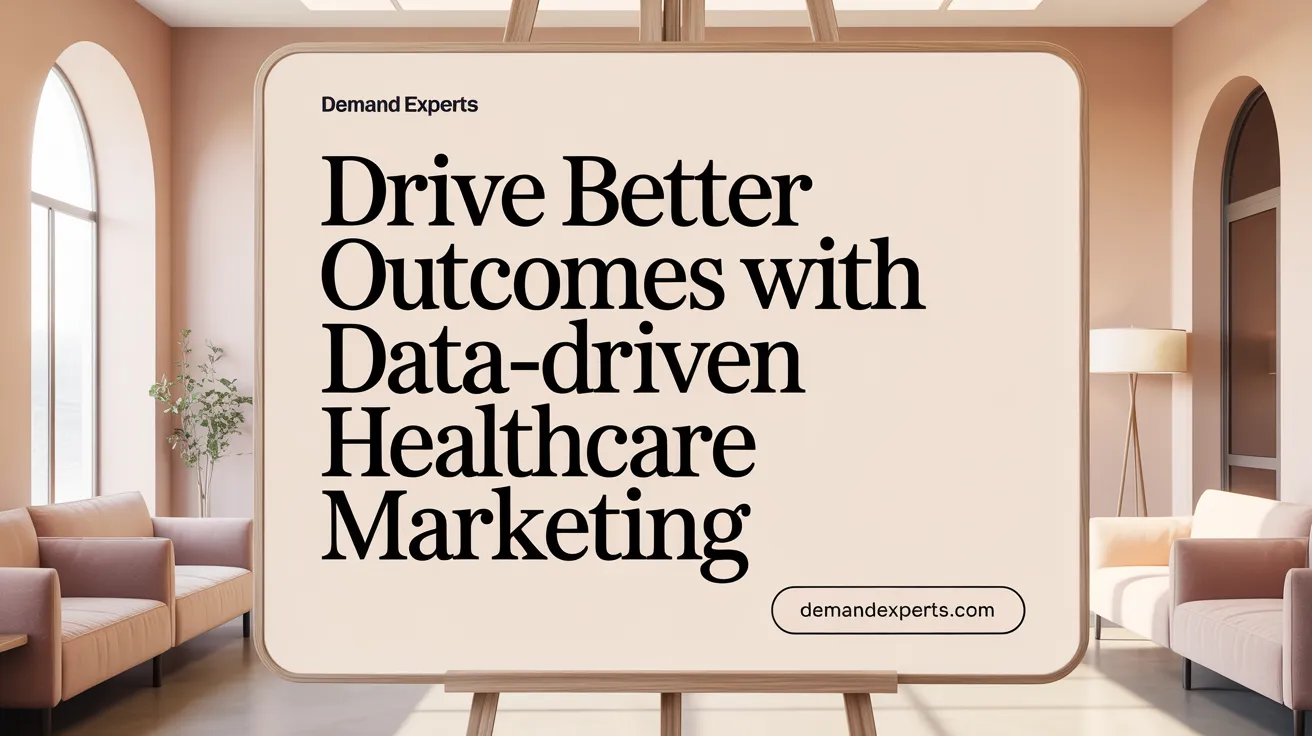
Why is data analytics crucial in healthcare marketing?
Data analytics is foundational for healthcare marketing as it enables organizations to track critical metrics including brand awareness, website traffic, social media engagement, click-through rates, and conversions. These insights inform marketers about the effectiveness of their digital campaigns, allowing for timely adjustments that maximize impact and resource efficiency. Continuously analyzing these data points ensures campaigns remain aligned with patient needs and evolving market dynamics. For more details, explore the Importance of digital marketing in healthcare.
Usage of platforms like Invoca for online and offline data
Platforms such as Invoca offer advanced conversation intelligence in healthcare marketing by integrating online and offline data sources. Invoca captures and analyzes data from digital interactions and phone conversations, providing a comprehensive view of the patient journey. This dual approach uncovers behavioral patterns and engagement triggers that are not visible through digital analytics alone, thereby enriching marketing strategies with nuanced, actionable intelligence. Learn more about Healthcare analytics and conversation intelligence.
How do conversation intelligence tools enhance patient engagement?
Conversation intelligence tools like Invoca deepen patient engagement by identifying trends and preferences from phone conversations in real time. They enable dynamic call routing and personalization tailored to individual patient needs, fostering a more responsive and empathetic communication experience. Importantly, these tools maintain strict adherence to privacy regulations such as HIPAA compliance in digital marketing, ensuring patient information is handled securely while facilitating data-driven marketing enhancements. See insights on HIPAA compliance in healthcare marketing and Healthcare CRM and personalized marketing.
Importance of real-time campaign adjustments
Real-time analytics provided by conversation intelligence platforms empower healthcare marketers to make swift campaign modifications. This agility supports optimized patient outreach, improved conversion rates, and effective allocation of marketing budgets. The ability to respond immediately to emerging patient behavior trends or campaign performance issues enhances overall marketing ROI and patient satisfaction. Related strategies discussed in Digital marketing in healthcare.
Balancing analytics with HIPAA compliance
While leveraging data analytics and conversation intelligence is invaluable, healthcare marketers must rigorously comply with HIPAA compliance in healthcare marketing and other privacy standards. This includes using secure platforms, anonymizing sensitive information where necessary, and obtaining proper consents. Striking this balance ensures ethical marketing practices, protects patient privacy, and builds trust, which are vital elements in healthcare communications. For comprehensive guidance, refer to Compliance in healthcare marketing and HIPAA compliance in digital marketing.
| Aspect | Description | Impact |
|---|---|---|
| Metrics Tracked | Brand awareness, traffic, engagement, conversions | Inform campaign effectiveness and strategy adjustments (Healthcare digital marketing strategies |
| Conversation Intelligence Usage | Analyzes digital and phone interactions | Enhances patient understanding and personalizes outreach (Healthcare analytics and conversation intelligence |
| Real-Time Adjustments | Immediate campaign tweaks based on data trends | Improves ROI, patient engagement, and responsiveness (Digital marketing in healthcare |
| Privacy Compliance (HIPAA) | Secure data handling and consent management | Ensures ethical marketing and patient trust (HIPAA compliance in healthcare marketing) |
Navigating Compliance and Ethical Standards in Healthcare Digital Marketing
What compliance considerations affect healthcare digital marketing?
Healthcare digital marketing is governed by stringent regulatory requirements such as HIPAA compliance in digital marketing in the United States and GDPR in Europe, which mandate the protection of patient data privacy. Marketing initiatives must ensure that all patient information is handled securely and that communications comply with these regulations to avoid legal risks. This includes implementing HIPAA-compliant platforms for email and SMS marketing, managing patient consent before sharing data, and maintaining transparency on data use.
Patient privacy protection strategies
To safeguard patient privacy, healthcare organizations deploy encryption, anonymization, and secure data storage solutions within their marketing systems. Consent management is critical, ensuring patients approve the use of their information before outreach. Additionally, digital marketing campaigns employ Healthcare marketing privacy-first targeting approaches, avoiding unauthorized use of personal health data and focusing on first-party data sources. All content and communication protocols uphold confidentiality to maintain compliance.
Ethical transparency in marketing communications
Ethical transparency requires healthcare marketers to provide honest, clear, and respectful messaging that aligns with patient well-being. They must disclose data collection practices, avoid misleading claims, and ensure that advertisements do not exploit patient vulnerabilities. Upholding ethical standards builds trust and reflects a commitment to patient-centric care as described in ethical healthcare marketing practices.
How does compliance impact patient trust?
Compliance with regulatory frameworks and ethical transparency signals to patients that their private health information is protected and respected. This commitment enhances credibility and fosters long-term relationships, increasing patient loyalty and engagement. Conversely, breaches or opaque practices can damage reputation and undermine patient confidence, making compliance a strategic imperative in healthcare marketing as discussed in building trust in healthcare marketing.
Integrating Emerging Technologies: AI, AR, and VR in Patient Engagement
How does AI transform healthcare marketing?
Artificial intelligence revolutionizes healthcare marketing by enabling faster and more accurate data analysis, which allows marketers to deeply personalize patient interactions. AI-driven predictive analytics segment patient populations more effectively, anticipating individual health behaviors and preferences. This leads to highly targeted outreach, improved patient engagement, and streamlined marketing automation. By integrating these AI capabilities, healthcare organizations optimize campaign effectiveness while maintaining compliance with privacy regulations, resulting in enhanced operational efficiency and patient satisfaction. For more details, see AI technology in healthcare marketing, AI in healthcare marketing, and Conversation intelligence in healthcare marketing.
What role do AR and VR play in healthcare marketing?
Augmented reality (AR) and virtual reality (VR) technologies provide immersive, interactive experiences that enhance patient education and brand differentiation. These tools allow patients to visualize medical procedures, anatomy, or treatment plans in an engaging and comprehensible manner, fostering trust and empowering informed decision-making. AR and VR can also serve as innovative platforms for marketing campaigns, showcasing cutting-edge capabilities and increasing patient engagement through experiential content. Learn more in Video Content Marketing in Healthcare and AI AR VR in healthcare.
Benefits of AI, AR, and VR for operational efficiencies
Integrating AI streamlines data management and automates personalized communication, reducing administrative burden and improving resource allocation. AR and VR enhance education and training for both patients and healthcare staff, potentially decreasing appointment no-shows and improving treatment adherence. Together, these technologies enable healthcare providers to deliver superior, patient-centric care experiences while optimizing operational workflows. Refer to Digital Patient Engagement and Healthcare CRM Platform for deeper insights.
Future trends in healthcare digital marketing
Emerging trends indicate accelerated adoption of AI-powered conversational platforms, real-time data analytics, and hyper-personalized content delivery. AR and VR applications are expected to grow, particularly in remote patient education and virtual consultations. Healthcare marketers plan to leverage these tools to create more engaging, privacy-compliant, omnichannel communication strategies in healthcare that drive measurable patient growth and loyalty. Explore comprehensive strategies at Healthcare Digital Marketing Strategies and Healthcare marketing strategies.
Building a Seamless Patient Journey Through Omnichannel Communication

What is the benefit of an omnichannel approach for healthcare providers?
An omnichannel communication strategy in healthcare integrates multiple digital platforms to deliver consistent, personalized messaging to patients. This approach ensures patients experience a unified and seamless interaction regardless of the communication channel used. Consistent messaging across digital platforms boosts patient engagement by reinforcing trust and clarity, ultimately supporting improved health outcomes and patient satisfaction (digital patient engagement, patient engagement strategies, omnichannel communication strategies in healthcare).
Which digital tools support effective patient-provider communication?
Healthcare providers leverage several digital tools to enhance patient-provider communication, including:
- Secure Messaging Platforms: Enable confidential, compliant exchanges of information between patients and providers (HIPAA compliance in digital marketing, secure patient messaging).
- Mobile Applications: Allow patients to access health information, schedule appointments, and receive notifications conveniently (mobile optimization in healthcare marketing, healthcare mobile apps).
- Telehealth Services: Facilitate virtual consultations, expanding access to care while maintaining personalized interactions (telehealth marketing trends, virtual care marketing).
- Automated Follow-ups: Support timely reminders for appointments, medication adherence, and health monitoring (automated patient follow-ups, automated patient engagement technology).
These tools not only improve patient convenience but also promote continuous engagement and adherence to care plans (patient engagement and service line growth).
Consistent Messaging Across Digital Platforms
Applying a cohesive content strategy across websites, email, SMS, mobile apps, and social media channels ensures that healthcare organizations maintain clarity and professionalism. This coordinated approach eliminates confusion and strengthens the provider's brand image while delivering relevant health information tailored to patient needs (consistent brand experience, healthcare email marketing, healthcare social media marketing).
Improving Patient Convenience and Engagement
By integrating omnichannel communication strategies, healthcare providers meet patients on their preferred platforms. This approach maximizes accessibility and responsiveness, making healthcare interactions more patient-centric. The convenience of using secure, easy-to-access tools boosts patient participation, fosters loyalty, and enhances overall healthcare experiences (patient engagement strategies, boosting patient engagement, digital patient engagement benefits).
The Critical Impact of Online Reputation and Review Management

Why is online reputation important for healthcare providers?
Patients increasingly rely on online reviews when selecting healthcare providers, with over 80% evaluating them before booking an appointment. A strong online reputation serves as a powerful trust signal, influencing patient acquisition by assuring potential patients of quality care and positive outcomes. Learn more about the importance of digital marketing in healthcare.
How can healthcare practices effectively manage online reviews?
Healthcare practices should actively encourage satisfied patients to leave reviews on prominent platforms like Google and Healthgrades. Responding promptly and professionally to both positive and negative feedback demonstrates engagement and commitment to patient satisfaction. Additionally, showcasing patient testimonials on websites and social media enhances credibility and builds trust with prospective patients. Explore strategies on managing online reputation in healthcare.
Strategies for Collecting and Showcasing Patient Testimonials
- Implement follow-up communications post-visit to request reviews
- Use HIPAA compliance in digital marketing methods to obtain patient consent before sharing testimonials
- Highlight diverse patient stories through video and written formats across digital channels
For detailed best practices, see patient engagement software and testimonials.
Managing Reputation Across Platforms
Maintaining consistency across multiple review sites is crucial. Regular monitoring and management help identify and address issues swiftly, while leveraging positive patient feedback boosts an organization's public image and search engine visibility. Refer to digital marketing strategies for hospitals and health systems.
Effect on Patient Acquisition and Trust
An effectively managed online reputation directly translates to increased patient inquiries and appointment bookings. Positive reviews and authentic testimonials foster trust, differentiate the practice in competitive markets, and contribute to sustained patient engagement and loyalty. Discover more on patient engagement and acquiring patients digitally.
Advancing Patient Engagement with Strategic Digital Marketing
Strategic Approaches to Digital Patient Engagement
Healthcare organizations must implement multifaceted digital marketing strategies that cater directly to patient needs and preferences. Key tactics include:
- Search Engine Optimization (SEO): Optimizing content for healthcare-related queries to ensure visibility where 77% of patients research providers online.
- Mobile Optimization: Given over 50% of searches originate from mobile devices, responsive designs and apps improve accessibility and patient interaction.
- Video and Content Marketing: Utilizing patient testimonials and educational videos can increase conversion rates by up to 80%, fostering trust and clarity.
- Social Media Engagement: Active presence influences 57% of treatment decisions; leveraging platforms for tailored content enhances relationships and outreach.
- Personalized Campaigns: Leveraging healthcare CRM data to deliver targeted and relevant messages increases treatment initiation and adherence.
- Email and SMS Campaigns: Mobile-optimized, privacy-compliant strategies maintain ongoing patient communication and appointment adherence.
Emphasizing Continuous Optimization and Compliance
Data analytics play a pivotal role in measuring patient engagement metrics such as website traffic, social interaction, click-through rates, and conversion. This ongoing insight allows marketers to adjust campaigns dynamically, ensuring relevance and effectiveness. Compliance with HIPAA and data privacy regulations remains critical, safeguarding patient information during all digital interactions and fostering patient confidence in healthcare brands.
Future Outlook for Healthcare Digital Marketing
Innovations such as artificial intelligence, predictive analytics, and conversation intelligence tools are set to revolutionize patient engagement. These technologies facilitate hyper-personalized experiences, efficient communication, and streamlined patient journeys. Moving forward, healthcare marketers must embrace omnichannel strategies and privacy-first approaches to maintain trust while enhancing patient acquisition and retention, ultimately driving improved health outcomes and sustainable organizational growth.
The Vital Role of Digital Marketing in Modern Healthcare
Importance of Digital Marketing in Healthcare
Digital marketing has become indispensable in healthcare due to the significant shift in how patients seek and engage with health information. Approximately 77% of patients conduct online research before booking appointments, underscoring the necessity for healthcare providers to maintain a strong digital presence. Digital channels enable organizations to reach patients efficiently, improve brand visibility, and foster trust.
Patient Online Research Behaviors
With over 93 million Americans actively searching for health-related information online, patient engagement through digital platforms is high. Research reveals that search engines direct three times as many visitors to hospital websites compared to other sources. Additionally, mobile search now accounts for over half of these queries, highlighting the critical need for mobile-optimized websites and seamless user experiences across devices.
Rise of Digital Engagement Post-Pandemic
The COVID-19 pandemic accelerated the reliance on digital tools within healthcare. Patients have normalized digital interactions such as telehealth consultations and online appointment scheduling. This surge emphasizes the importance of multi-channel strategies that include web presence, social media, and mobile outreach to meet evolving patient expectations and maintain continuous engagement.
Overview of Key Digital Channels
Healthcare providers leverage several digital marketing channels to connect with patients effectively:
- Search Engine Optimization (SEO): Enhances visibility when patients seek health information.
- Social Media: Influences over half of patients’ treatment decisions and supports community engagement.
- Email Marketing: Provides personalized and educational communication, optimized for mobile devices.
- Video Content: Increases landing page conversions by up to 80%, fostering trust through patient stories. These integrated approaches enable healthcare organizations to attract, acquire, and retain patients while adhering to privacy and compliance standards.
Leveraging SEO and Mobile Optimization to Capture Patient Attention

Why is SEO critical for healthcare providers?
Search engines are the dominant gateway for patients seeking healthcare information online, driving three times more visitors to hospital websites than all other sources combined. This trend necessitates the implementation of effective Search Engine Optimization (SEO) strategies. Robust SEO improves online visibility, enabling healthcare providers to reach patients actively researching symptoms, treatments, or provider options. Technical SEO elements—including keyword research, compelling meta descriptions, and compliance with Google's E-A-T (Expertise, Authoritativeness, Trustworthiness) guidelines—ensure websites rank highly in relevant search queries, establishing credibility and improving patient trust.
How does mobile optimization affect patient engagement?
More than half of all healthcare-related online searches originate on mobile devices. This shift toward mobile usage places significant importance on having mobile-optimized websites. Effective mobile design ensures responsive layouts, fast loading times, and user-friendly navigation tailored for smaller screens. Data shows that approximately 44% of patients who research hospital services on a mobile device proceed to schedule appointments, reinforcing the direct impact mobile optimization has on patient conversion rates. Given this, healthcare organizations should prioritize mobile-friendly content and consider dedicated mobile apps or simplified interfaces to enhance the patient experience (Healthcare mobile marketing trends 2023).
Enhancing patient reach through local SEO and reputation management
Local SEO strategies help healthcare providers attract patients within specific geographical areas by optimizing for search terms such as "urgent care near me" or "family physician in [city]." Tactics include creating localized web pages, maintaining accurate directory listings, and collecting patient reviews. Reputation management plays a vital role in local SEO, as a majority of patients consult recent online reviews—particularly on Google—before choosing providers. Timely responses to reviews and leveraging positive patient testimonials build credibility, increase search rankings, and ultimately drive patient acquisition.
Technical SEO considerations in healthcare marketing
Healthcare websites must incorporate technical SEO best practices, including structured data implementation, XML sitemaps, and robots.txt files, to support crawlability and indexation by search engines. Regular audits improve website health and user experience, while voice search optimization is increasingly relevant as patients use voice-enabled assistants to find healthcare information. Ensuring compliance with privacy and content quality guidelines further enhances ranking potential and patient trust.
By integrating comprehensive SEO strategies with mobile optimization and local reputation management, healthcare organizations can effectively capture patient attention, drive appointment bookings, and enhance overall digital engagement (Importance of digital marketing in healthcare).
The Power of Video and Content Marketing in Building Trust
How effective is video marketing for healthcare providers?
Video marketing stands out as a highly effective tool in healthcare digital marketing, capable of increasing conversion rates on landing pages by up to 80%. This substantial boost underscores its power in turning web visitors into engaged patients. Videos that showcase patient stories and testimonials deepen trust, making healthcare providers appear more relatable and credible. These authentic narratives help prospective patients feel confident and emotionally connected, which significantly influences their healthcare decisions. For additional insights, see Benefits of video marketing in healthcare.
What role does content marketing play in patient engagement?
Content marketing serves as a cornerstone strategy for establishing healthcare providers as trusted authorities. By delivering high-quality, accurate, and personalized content, healthcare marketers can enhance patient education and engagement. Informative blogs, wellness tips, and procedure guides not only attract more visitors but also enable patients to make knowledgeable choices regarding their care. Learn more about Content marketing in healthcare and Personalized healthcare marketing campaigns.
Educational content's impact in healthcare marketing
Educational content builds a foundation of trust by addressing patients' concerns, demystifying medical information, and guiding them through their health journeys. When paired with personalized delivery—leveraging patient data and segmentation—this content fosters ongoing engagement and supports treatment adherence. See resources on Educational content in healthcare marketing emails and Patient engagement strategies.
Integrating video and content marketing for maximum impact
Combining video content with well-crafted written materials creates a comprehensive digital marketing approach. Videos engage senses and emotions, while detailed written content satisfies the need for in-depth information. Together, they enhance patient experience, credibility, and ultimately, patient growth for healthcare organizations. For further reading, review Video marketing in healthcare and Healthcare digital marketing strategies.
Harnessing Social Media to Influence Patient Decisions and Build Community
How does social media affect patient healthcare decisions?
Social media significantly impacts patient healthcare choices. Studies show that 57% of patients’ decisions to pursue treatment are influenced by healthcare providers’ social media presence. This demonstrates the power of social channels as a direct line to patients for education, trust-building, and engagement. Platforms such as Facebook, YouTube, and WhatsApp offer vast reach and help patients discover reliable health information, reviews, and testimonials that guide their decisions (Patient education through social media, Healthcare social media marketing strategies, Social media influence on patient decisions.
What strategies optimize social media for healthcare marketing?
Effective healthcare social media marketing employs a mix of organic content, paid advertising, and influencer collaborations. Organic content—including educational posts, wellness tips, and patient stories—builds ongoing engagement and credibility. Paid campaigns allow targeted outreach to specific demographics and geographic areas, amplifying visibility and lead generation.
Employing culturally competent messaging ensures inclusivity and relevance, fostering stronger community connections. Influencer partnerships with healthcare professionals can enhance authenticity and reach (Healthcare social media marketing strategies, Healthcare digital marketing strategies, Healthcare influencer marketing).
Building online patient communities and support groups
Creating online patient communities on social media platforms such as Facebook groups or Google Hangouts provides safe spaces for peer support and information sharing. These groups foster emotional engagement, improve health literacy, and encourage behavioral changes like smoking cessation. They also strengthen patient loyalty and trust toward healthcare providers (Patient engagement strategies, Patient education through social media, Social media for patient engagement).
Social media usage statistics among patients
Approximately 69% of Americans use Facebook, and 73% use YouTube, highlighting high patient engagement. In developing regions, platforms like WhatsApp see usage rates as high as 80%, underlining the global potential for healthcare outreach (Patient education through social media, Social media usage statistics).
Together, these social media strategies form a comprehensive approach to influence patient decisions, improve educational outreach, and build supportive healthcare communities in compliance with privacy standards (Digital marketing in healthcare, HIPAA compliance in digital marketing).
Personalized Patient Engagement Through Healthcare CRM Platforms
How do healthcare CRM systems improve patient engagement?
Healthcare CRM platforms are pivotal in transforming patient engagement by offering a comprehensive 360-degree view of patient information. These systems integrate clinical, demographic, and behavioral data to enable highly personalized communication strategies. AI-driven recommendations facilitate timely interventions by suggesting next-best-actions tailored to each patient's unique profile, such as medication reminders or educational content delivery.
Automation capabilities streamline patient communication processes, ensuring consistent outreach without burdening staff. This automation supports therapy adherence and treatment initiation by sending personalized messages through preferred channels, enhancing both the efficiency and effectiveness of engagement.
Why is segmentation important in healthcare marketing?
Segmentation in healthcare marketing is essential for delivering relevant and impactful messaging. By categorizing patients based on demographics, clinical history, behavioral patterns, and social determinants of health (SDoH), healthcare marketers can tailor campaigns that resonate more deeply with diverse patient groups. For insights into digital patient acquisition strategies, including segmentation, see this resource.
This targeted approach improves patient responsiveness and supports better health outcomes by addressing individual needs and barriers. For example, patients with chronic conditions can receive specialized content and follow-up reminders, while high-risk populations might be engaged with preventive care messaging.
Benefits of Personalization Using CRM Platforms
- Enhanced patient adherence: AI-powered insights inform personalized care plans and communication.
- Efficient communication: Automated workflows reduce administrative overhead.
- Improved outreach: Tailored campaigns boost treatment initiation rates.
- Compliance assurance: Platforms ensure messaging aligns with healthcare regulations.
Healthcare CRM platforms empower organizations to execute data-driven, patient-centric marketing strategies that not only foster trust but also drive measurable improvements in patient retention and care outcomes. More on Patient Engagement Software and AI-Driven Patient Experience.
Strategic Email and SMS Marketing for Patient Retention and Education
What makes email marketing effective in healthcare?
Email marketing stands out as a cost-effective and impactful tool in healthcare marketing. Its effectiveness is driven by mobile optimization, ensuring content is accessible and engaging on smartphones where over 80% of patients access information. Personalization through segmentation allows healthcare providers to tailor messages based on patient demographics, health history, and preferences, which enhances relevance and promotes higher engagement. Clear and compelling calls to action within emails guide patients toward scheduling appointments, accessing educational content, or managing their care effectively, facilitating both retention and ongoing patient education.
How do SMS campaigns complement email outreach?
SMS marketing delivers concise, instant communication, serving as a timely reminder tool that complements the more detailed engagement provided by email. Its immediacy and high open rates make SMS ideal for appointment confirmations, medication reminders, and preventive care prompts. These short, actionable messages increase adherence to care plans by reducing missed appointments and improving medication compliance, thereby supporting overall patient outcomes and satisfaction. For additional insights, see healthcare SMS marketing.
Privacy and HIPAA compliance considerations
Both email and SMS campaigns in healthcare must rigorously comply with HIPAA compliance in digital marketing and data privacy regulations. This involves securing patient consent, encrypting communications, and implementing robust data protection measures. Ensuring that marketing platforms and messages meet privacy standards maintains patient trust and safeguards sensitive health information. Learn more about HIPAA compliance in healthcare marketing.
Mobile optimization and segmentation in email campaigns
Optimizing emails for mobile devices is essential given the predominance of mobile searches and digital interactions. Segmentation strategies enhance effectiveness by delivering relevant, timely content that aligns with individual patient needs. Combining these practices fosters stronger patient-provider relationships by offering personalized, accessible communication that supports patient education and retention. For strategies and data, refer to mobile-optimized email campaigns.
Applying Data Analytics and Conversation Intelligence to Optimize Campaigns

Why is data analytics crucial in healthcare marketing?
Data analytics is foundational for healthcare marketing as it enables organizations to track critical metrics including brand awareness, website traffic, social media engagement, click-through rates, and conversions. These insights inform marketers about the effectiveness of their digital campaigns, allowing for timely adjustments that maximize impact and resource efficiency. Continuously analyzing these data points ensures campaigns remain aligned with patient needs and evolving market dynamics. For more details, explore the Importance of digital marketing in healthcare.
Usage of platforms like Invoca for online and offline data
Platforms such as Invoca offer advanced conversation intelligence in healthcare marketing by integrating online and offline data sources. Invoca captures and analyzes data from digital interactions and phone conversations, providing a comprehensive view of the patient journey. This dual approach uncovers behavioral patterns and engagement triggers that are not visible through digital analytics alone, thereby enriching marketing strategies with nuanced, actionable intelligence. Learn more about Healthcare analytics and conversation intelligence.
How do conversation intelligence tools enhance patient engagement?
Conversation intelligence tools like Invoca deepen patient engagement by identifying trends and preferences from phone conversations in real time. They enable dynamic call routing and personalization tailored to individual patient needs, fostering a more responsive and empathetic communication experience. Importantly, these tools maintain strict adherence to privacy regulations such as HIPAA compliance in digital marketing, ensuring patient information is handled securely while facilitating data-driven marketing enhancements. See insights on HIPAA compliance in healthcare marketing and Healthcare CRM and personalized marketing.
Importance of real-time campaign adjustments
Real-time analytics provided by conversation intelligence platforms empower healthcare marketers to make swift campaign modifications. This agility supports optimized patient outreach, improved conversion rates, and effective allocation of marketing budgets. The ability to respond immediately to emerging patient behavior trends or campaign performance issues enhances overall marketing ROI and patient satisfaction. Related strategies discussed in Digital marketing in healthcare.
Balancing analytics with HIPAA compliance
While leveraging data analytics and conversation intelligence is invaluable, healthcare marketers must rigorously comply with HIPAA compliance in healthcare marketing and other privacy standards. This includes using secure platforms, anonymizing sensitive information where necessary, and obtaining proper consents. Striking this balance ensures ethical marketing practices, protects patient privacy, and builds trust, which are vital elements in healthcare communications. For comprehensive guidance, refer to Compliance in healthcare marketing and HIPAA compliance in digital marketing.
| Aspect | Description | Impact |
|---|---|---|
| Metrics Tracked | Brand awareness, traffic, engagement, conversions | Inform campaign effectiveness and strategy adjustments (Healthcare digital marketing strategies |
| Conversation Intelligence Usage | Analyzes digital and phone interactions | Enhances patient understanding and personalizes outreach (Healthcare analytics and conversation intelligence |
| Real-Time Adjustments | Immediate campaign tweaks based on data trends | Improves ROI, patient engagement, and responsiveness (Digital marketing in healthcare |
| Privacy Compliance (HIPAA) | Secure data handling and consent management | Ensures ethical marketing and patient trust (HIPAA compliance in healthcare marketing) |
Navigating Compliance and Ethical Standards in Healthcare Digital Marketing
What compliance considerations affect healthcare digital marketing?
Healthcare digital marketing is governed by stringent regulatory requirements such as HIPAA compliance in digital marketing in the United States and GDPR in Europe, which mandate the protection of patient data privacy. Marketing initiatives must ensure that all patient information is handled securely and that communications comply with these regulations to avoid legal risks. This includes implementing HIPAA-compliant platforms for email and SMS marketing, managing patient consent before sharing data, and maintaining transparency on data use.
Patient privacy protection strategies
To safeguard patient privacy, healthcare organizations deploy encryption, anonymization, and secure data storage solutions within their marketing systems. Consent management is critical, ensuring patients approve the use of their information before outreach. Additionally, digital marketing campaigns employ Healthcare marketing privacy-first targeting approaches, avoiding unauthorized use of personal health data and focusing on first-party data sources. All content and communication protocols uphold confidentiality to maintain compliance.
Ethical transparency in marketing communications
Ethical transparency requires healthcare marketers to provide honest, clear, and respectful messaging that aligns with patient well-being. They must disclose data collection practices, avoid misleading claims, and ensure that advertisements do not exploit patient vulnerabilities. Upholding ethical standards builds trust and reflects a commitment to patient-centric care as described in ethical healthcare marketing practices.
How does compliance impact patient trust?
Compliance with regulatory frameworks and ethical transparency signals to patients that their private health information is protected and respected. This commitment enhances credibility and fosters long-term relationships, increasing patient loyalty and engagement. Conversely, breaches or opaque practices can damage reputation and undermine patient confidence, making compliance a strategic imperative in healthcare marketing as discussed in building trust in healthcare marketing.
Integrating Emerging Technologies: AI, AR, and VR in Patient Engagement
How does AI transform healthcare marketing?
Artificial intelligence revolutionizes healthcare marketing by enabling faster and more accurate data analysis, which allows marketers to deeply personalize patient interactions. AI-driven predictive analytics segment patient populations more effectively, anticipating individual health behaviors and preferences. This leads to highly targeted outreach, improved patient engagement, and streamlined marketing automation. By integrating these AI capabilities, healthcare organizations optimize campaign effectiveness while maintaining compliance with privacy regulations, resulting in enhanced operational efficiency and patient satisfaction. For more details, see AI technology in healthcare marketing, AI in healthcare marketing, and Conversation intelligence in healthcare marketing.
What role do AR and VR play in healthcare marketing?
Augmented reality (AR) and virtual reality (VR) technologies provide immersive, interactive experiences that enhance patient education and brand differentiation. These tools allow patients to visualize medical procedures, anatomy, or treatment plans in an engaging and comprehensible manner, fostering trust and empowering informed decision-making. AR and VR can also serve as innovative platforms for marketing campaigns, showcasing cutting-edge capabilities and increasing patient engagement through experiential content. Learn more in Video Content Marketing in Healthcare and AI AR VR in healthcare.
Benefits of AI, AR, and VR for operational efficiencies
Integrating AI streamlines data management and automates personalized communication, reducing administrative burden and improving resource allocation. AR and VR enhance education and training for both patients and healthcare staff, potentially decreasing appointment no-shows and improving treatment adherence. Together, these technologies enable healthcare providers to deliver superior, patient-centric care experiences while optimizing operational workflows. Refer to Digital Patient Engagement and Healthcare CRM Platform for deeper insights.
Future trends in healthcare digital marketing
Emerging trends indicate accelerated adoption of AI-powered conversational platforms, real-time data analytics, and hyper-personalized content delivery. AR and VR applications are expected to grow, particularly in remote patient education and virtual consultations. Healthcare marketers plan to leverage these tools to create more engaging, privacy-compliant, omnichannel communication strategies in healthcare that drive measurable patient growth and loyalty. Explore comprehensive strategies at Healthcare Digital Marketing Strategies and Healthcare marketing strategies.
Building a Seamless Patient Journey Through Omnichannel Communication

What is the benefit of an omnichannel approach for healthcare providers?
An omnichannel communication strategy in healthcare integrates multiple digital platforms to deliver consistent, personalized messaging to patients. This approach ensures patients experience a unified and seamless interaction regardless of the communication channel used. Consistent messaging across digital platforms boosts patient engagement by reinforcing trust and clarity, ultimately supporting improved health outcomes and patient satisfaction (digital patient engagement, patient engagement strategies, omnichannel communication strategies in healthcare).
Which digital tools support effective patient-provider communication?
Healthcare providers leverage several digital tools to enhance patient-provider communication, including:
- Secure Messaging Platforms: Enable confidential, compliant exchanges of information between patients and providers (HIPAA compliance in digital marketing, secure patient messaging).
- Mobile Applications: Allow patients to access health information, schedule appointments, and receive notifications conveniently (mobile optimization in healthcare marketing, healthcare mobile apps).
- Telehealth Services: Facilitate virtual consultations, expanding access to care while maintaining personalized interactions (telehealth marketing trends, virtual care marketing).
- Automated Follow-ups: Support timely reminders for appointments, medication adherence, and health monitoring (automated patient follow-ups, automated patient engagement technology).
These tools not only improve patient convenience but also promote continuous engagement and adherence to care plans (patient engagement and service line growth).
Consistent Messaging Across Digital Platforms
Applying a cohesive content strategy across websites, email, SMS, mobile apps, and social media channels ensures that healthcare organizations maintain clarity and professionalism. This coordinated approach eliminates confusion and strengthens the provider's brand image while delivering relevant health information tailored to patient needs (consistent brand experience, healthcare email marketing, healthcare social media marketing).
Improving Patient Convenience and Engagement
By integrating omnichannel communication strategies, healthcare providers meet patients on their preferred platforms. This approach maximizes accessibility and responsiveness, making healthcare interactions more patient-centric. The convenience of using secure, easy-to-access tools boosts patient participation, fosters loyalty, and enhances overall healthcare experiences (patient engagement strategies, boosting patient engagement, digital patient engagement benefits).
The Critical Impact of Online Reputation and Review Management

Why is online reputation important for healthcare providers?
Patients increasingly rely on online reviews when selecting healthcare providers, with over 80% evaluating them before booking an appointment. A strong online reputation serves as a powerful trust signal, influencing patient acquisition by assuring potential patients of quality care and positive outcomes. Learn more about the importance of digital marketing in healthcare.
How can healthcare practices effectively manage online reviews?
Healthcare practices should actively encourage satisfied patients to leave reviews on prominent platforms like Google and Healthgrades. Responding promptly and professionally to both positive and negative feedback demonstrates engagement and commitment to patient satisfaction. Additionally, showcasing patient testimonials on websites and social media enhances credibility and builds trust with prospective patients. Explore strategies on managing online reputation in healthcare.
Strategies for Collecting and Showcasing Patient Testimonials
- Implement follow-up communications post-visit to request reviews
- Use HIPAA compliance in digital marketing methods to obtain patient consent before sharing testimonials
- Highlight diverse patient stories through video and written formats across digital channels
For detailed best practices, see patient engagement software and testimonials.
Managing Reputation Across Platforms
Maintaining consistency across multiple review sites is crucial. Regular monitoring and management help identify and address issues swiftly, while leveraging positive patient feedback boosts an organization's public image and search engine visibility. Refer to digital marketing strategies for hospitals and health systems.
Effect on Patient Acquisition and Trust
An effectively managed online reputation directly translates to increased patient inquiries and appointment bookings. Positive reviews and authentic testimonials foster trust, differentiate the practice in competitive markets, and contribute to sustained patient engagement and loyalty. Discover more on patient engagement and acquiring patients digitally.
Advancing Patient Engagement with Strategic Digital Marketing
Strategic Approaches to Digital Patient Engagement
Healthcare organizations must implement multifaceted digital marketing strategies that cater directly to patient needs and preferences. Key tactics include:
- Search Engine Optimization (SEO): Optimizing content for healthcare-related queries to ensure visibility where 77% of patients research providers online.
- Mobile Optimization: Given over 50% of searches originate from mobile devices, responsive designs and apps improve accessibility and patient interaction.
- Video and Content Marketing: Utilizing patient testimonials and educational videos can increase conversion rates by up to 80%, fostering trust and clarity.
- Social Media Engagement: Active presence influences 57% of treatment decisions; leveraging platforms for tailored content enhances relationships and outreach.
- Personalized Campaigns: Leveraging healthcare CRM data to deliver targeted and relevant messages increases treatment initiation and adherence.
- Email and SMS Campaigns: Mobile-optimized, privacy-compliant strategies maintain ongoing patient communication and appointment adherence.
Emphasizing Continuous Optimization and Compliance
Data analytics play a pivotal role in measuring patient engagement metrics such as website traffic, social interaction, click-through rates, and conversion. This ongoing insight allows marketers to adjust campaigns dynamically, ensuring relevance and effectiveness. Compliance with HIPAA and data privacy regulations remains critical, safeguarding patient information during all digital interactions and fostering patient confidence in healthcare brands.
Future Outlook for Healthcare Digital Marketing
Innovations such as artificial intelligence, predictive analytics, and conversation intelligence tools are set to revolutionize patient engagement. These technologies facilitate hyper-personalized experiences, efficient communication, and streamlined patient journeys. Moving forward, healthcare marketers must embrace omnichannel strategies and privacy-first approaches to maintain trust while enhancing patient acquisition and retention, ultimately driving improved health outcomes and sustainable organizational growth.



